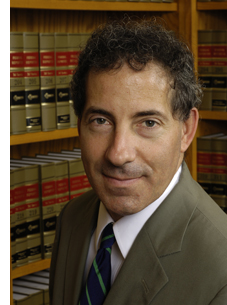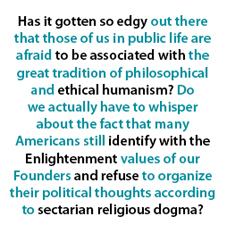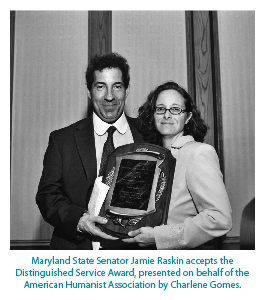One Nation Under the Constitution: Reason, Politics, and Morality in the New Century

Maryland State Senator Jamie Raskin, an attorney and professor of constitutional law who has earned national recognition as a civil rights and civil liberties advocate, was honored by the American Humanist Association on Friday, June 6, 2008, with its Distinguished Service Award at the World Humanist Congress in Washington, DC. The following is adapted from his acceptance speech.
This is a high honor–perhaps higher than you know. On our way out to the award ceremony my wife, Sarah, and I overheard our youngest daughter, Tabitha, telling her friend that she couldn’t have a sleepover “because my dad is getting an award for being Human of the Year.” That’s not bad–when your kids think you’ve won something bigger than a Nobel Peace Prize.
I felt strongly about accepting the award because the letter and calls I received in offering it were indelibly poignant. The letter essentially said: Congratulations, Senator Raskin, we have decided to extend to you the AHA Distinguished Service Award at the World Humanist Congress for your aggressive defense of the separation of church and state and for promoting human rights, but we hasten to add that you don’t have to accept the award and, don’t worry–if you decide to decline it, we will be happy not to tell anyone we even offered it to you.
So I thought: wow, that’s interesting. I’d never even heard of a politician turning down an award before, much less asking the offering party to keep the whole thing hush-hush. Has it gotten so edgy out there that those of us in public life are afraid to be associated with the great tradition of philosophical and ethical humanism? Do we actually have to whisper about the fact that many Americans still identify with the Enlightenment values of our Founders and refuse to organize their political thoughts according to sectarian religious dogma? I vowed to show up in person so people could see at least one other elected official besides the great U.S. Representative Pete Stark (D-CA) who isn’t afraid to utter the “h” word in public.
 I hasten to add that, as tempting as it is to cast ourselves in heroic terms, we should reject this whole “courage” thing–you know, about how brave we must be to stand up for the values of the Enlightenment and secular democracy in politics. The over-worked word “courage” doesn’t capture existentially what is at stake for people in public office when faced with naked assaults on reason. Defending humanist values and secular democracy in public settings has very little to do with courage and everything to do with self-respect and the gut instinct that we allow unreason to control public decision-making only at our own risk and peril. As Voltaire shrewdly put it, “Anyone who can make you believe absurdities can make you commit atrocities.”
I hasten to add that, as tempting as it is to cast ourselves in heroic terms, we should reject this whole “courage” thing–you know, about how brave we must be to stand up for the values of the Enlightenment and secular democracy in politics. The over-worked word “courage” doesn’t capture existentially what is at stake for people in public office when faced with naked assaults on reason. Defending humanist values and secular democracy in public settings has very little to do with courage and everything to do with self-respect and the gut instinct that we allow unreason to control public decision-making only at our own risk and peril. As Voltaire shrewdly put it, “Anyone who can make you believe absurdities can make you commit atrocities.”
That’s a pretty good summary of what happened with the Iraq War, the most disastrous outbreak of unreason in an administration thoroughly defined by its creepy contempt for science and uncensored thought. We were invited to believe that Saddam Hussein had weapons of mass destruction that he could use against the American people and this was why we had to take over Iraq. At the same time, we were told that North Korea, which was Saddam’s partner in the “Axis of Evil,” also had weapons of mass destruction but that was the reason why we could not invade North Korea.
Of course, in reality, our military must have known that Saddam did not have weapons of mass destruction that could threaten us, or else it would have been suicidal and criminal to go into Iraq in the first place. We only went in because we thought it would be easy, which of course it was not. But to have foreseen the calamities that would follow from this aggressive war would have required some sense of history and geography. It would have required some commitment to using reason instead of propaganda, which W.H. Auden ably defined as “the use of magic by those who no longer believe in it against those who still do.” The neo-con foreign policy Establishment took us to war by making people believe absurdities, and the results have been horrifying and calamitous. Saddam Hussein was obviously a madman and murderer (one that our foreign policy managers embraced when it was convenient) but he is gone and the nightmare of the Iraq War–with its attendant horrors, such as tens of thousands of dead and more than 200,000 Americans with traumatic brain injuries and post-traumatic stress syndrome–is still with us. I don’t think we’ll be falling for this particular trick again any time soon although the national security magicians are already back hard at work in Washington.
Many things undermine the force of reason in public decision: weak public schools, shaky civic literacy skills, the habits of violence and collective amnesia, the tyranny of monied special interests in politics. But the promotion of religious dogma and sectarianism through government continues to be a paradigm force undermining public reason. The more time we spend fighting about God and promoting “faith-based” government, the less time and energy we have to advance the common good and the truly moral public policies that lie at the heart of it.
It goes without saying that the actual purpose and effects of injecting religious dogma into government are never to make people more virtuous or holy but rather to advance specific political agendas. Sometimes the agenda is to wrap the aura of religiosity and holiness around a particular political party or faction; sometimes it is to get the state to resolve a problem that is internal to a religion; and sometimes it is just to promote sectarian creeds to the public and show religious minorities who’s the boss.
I remember an incident back in 1997 when I spent a sabbatical year working for the ACLU’s Washington office as First Amendment counsel. It was during the Ten Commandments controversy set off by Alabama Judge Roy Moore, who insisted on hanging the Ten Commandments behind him in the courtroom (including “Thou Shalt Not Kill,” even as he was sending capital defendants off to death row). I got a call from Congressman John Conyers (D-MI), Chairman of the House Judiciary Committee, saying that the Republicans were introducing a resolution to endorse the Ten Commandments and could we quickly put together some constitutional talking points on it.
Now, I thought, that’s pretty impressive, for the Republicans to come up with a proposal that manages to be unconstitutional and blasphemous at the same time. I urged the committee’s Democrats to remind the sponsors not only of the clause in the First Amendment forbidding establishment of religion by Congress but the provision in Article VI preventing any religious tests for public officeholders.
Alas, these arguments didn’t move the Republicans, who were more interested in demonstrating their personal devotion to the Bible than maintaining their public oath to the Constitution. So, alright, I said, why don’t you offer a rule that, if the members of the House are going to vote on the Ten Commandments, they should have to vote on each commandment separately–and members can’t vote for any commandment they’ve ever violated because then they’ll be taking the name of the Lord in vain, violating the third commandment at the same moment they are endorsing it! Well, this proposal also didn’t carry the day. Amazingly, the House proceeded to endorse the Ten Commandments on a bipartisan vote of 295-125.
This bit of pandering produced nothing other than sectarian animosity. Minority religionists were offended while those in the majority got to reaffirm their own privileged religious identity, not as a matter of faith but as a matter of power. (This reminds me of a joke from Belfast, Ireland, where a police officer stops a motorist and asks him, “Catholic or Protestant?” And the motorist says, “atheist.” To which the officer responds: “Catholic atheist or Protestant atheist?”)
 More innocently, religious legislation sometimes enters the halls of government not for reasons of aggression but because religious groups want government to solve their internal problems. In my first session as a senator in Maryland, a bill came to the floor that would have required people petitioning for divorce in the state to sign a statement attesting that they had removed any “religious” obstacle to their partner’s remarriage. This was an effort to deal with the problem of the get in Orthodox Jewish law, under which a woman cannot be divorced in the eyes of God, and thus is not eligible to remarry, until her husband offers this ancient written religious decree. The idea behind the bill was to withhold from the husband a legal divorce until he consented to granting his wife a religious divorce.
More innocently, religious legislation sometimes enters the halls of government not for reasons of aggression but because religious groups want government to solve their internal problems. In my first session as a senator in Maryland, a bill came to the floor that would have required people petitioning for divorce in the state to sign a statement attesting that they had removed any “religious” obstacle to their partner’s remarriage. This was an effort to deal with the problem of the get in Orthodox Jewish law, under which a woman cannot be divorced in the eyes of God, and thus is not eligible to remarry, until her husband offers this ancient written religious decree. The idea behind the bill was to withhold from the husband a legal divorce until he consented to granting his wife a religious divorce.
It was a clever idea, except for one thing: it’s totally unconstitutional. It would condition the receipt of a divorce–which is a public benefit, indeed a public right–on the person’s willingness to engage in a wholly religious act, here the granting of a get. Obviously we all want to tell these get-witholders to get over their sexist power trips, give their ex-wives the get and allow everyone to get on with their lives. But from a secular perspective, the state has already granted the women their divorce and they are perfectly free to remarry. Their problem lies within their religious practice. But the state cannot enter the terrain of religion to coerce people to perform religious acts. Religions must solve the problems that religions make.
In Lemon v. Kurtzman (1971), the Supreme Court said that a law fails the establishment clause if it doesn’t have a primarily secular purpose, if it doesn’t have a primarily secular effect, or if it excessively tangles church and state. If it fails any one of these prongs, the law is unconstitutional. Amazingly, the get bill failed all three prongs. Its entire purpose and primary hoped-for effect were religious in nature; and it entangled church and state in complicated ways. We were able to defeat the bill in the state Senate on a tie vote, 23-23.
When I pointed out the constitutional problems, it wasn’t exactly popular. Many people said to me that, because I am Jewish and because my colleague Rona Kramer–who spoke out eloquently against the bill–is also Jewish, we should have followed the wishes of leading Jewish groups that were lobbying for passage of the bill. But, of course, as public officials who have sworn an oath to defend the Constitution, we cannot break it for any reason at all, including a religious one. If legislators begin to waive their constitutional scruples for policies that will favor our own religious groups or ethnic communities, then we are all in deep trouble. We cannot pass off our constitutional commitments because we feel it is politically expedient to do so. In the final analysis, people got that; I was cheered that most people in the Jewish community understood how perilous it is to use government to promote religious agendas.
But the separation of church and state tests our commitment to the rule of law most strenuously when large majorities favor its violation to create public orthodoxy. Remember back in 2002 when the Ninth Circuit Court of Appeals in California ruled that it was unconstitutional for government to conduct the Pledge of Allegiance in public schools with the words “under God” added to it? That decision caused a storm of protest, although it was clearly right. When the radical Baptist minister Francis Bellamy wrote the Pledge in 1892, on the 400th anniversary of Columbus’ arrival in the New World, he omitted any reference to God because he thought it would be divisive. He wanted to unify the country against the continuing rituals conducted in the South around the Confederate battle flag, which is why he asked Americans to salute the flag of the Republic, “one nation, indivisible, with liberty and justice for all.” The words “under God” were added by Congress to this radical script in 1954, during the Cold War and McCarthy period, just a few months, interestingly, after the Supreme Court’s decision in Brown v. Board of Education. The purpose was explicitly religious, as President Eisenhower casually observed and as the Ninth circuit panel–led by Judge Goodwin, a Richard Nixon appointee–inescapably found. If the government can ask citizens to pledge allegiance “under God,” it can do the same under Allah, Jesus Christ, Moses, or Sun Myung Moon. From the standpoint of the establishment clause, these are all egregious and equally impermissible endorsements of religion.
I went on a conservative talk show to defend the decision. The host kept insisting that we must be “one nation under God” or one nation under something else. “What do you liberals want us to be under?” he asked. “Gee,” I said, “how about ‘one nation under Canada’? At least it would be geographically correct.” But then I suggested, quite seriously, “one nation under the Constitution.” After all, I argued, we aren’t of one religion, one race, one ethnicity, or one party, but we do have one Constitution and one Bill of Rights, and it is this political faith that ultimately binds us as a people and that led the Ninth circuit to its decision.
But, even as people stand up for constitutional patriotism and the separation of church and state against homegrown theocrats, I want to point out that this is only a part of the challenge for humanism, perhaps the less important one. Even more pressing a responsibility is to place the actual wellbeing of humanity at the forefront of the public agenda. This is the true moral imperative of our time.
Indeed, we must resist and reject any claim that morality has no place in politics; on the contrary, it seems clear to me that politics is all about moral choices. We should never flatter ourselves to think that, if we could simply answer all scientific questions, we would no longer have need for moral analysis and decision. Science can clarify some of our choices but it can never itself provide a key to choosing. Wittgenstein once said that, “We feel that [even] if all possible scientific questions be answered, the problems of life have still not been touched at all.” And Einstein too said that, ultimately, “imagination is more important than knowledge.” There is no escape from the necessity of choosing to act, and this is where humanism shines a valuable light.
How much we invest in schools, how we safeguard the public health, how we protect the environment for future generations, how we treat older people, whether we invest in war or human development–these are all, fundamentally, moral questions.
Now, sometimes people–not theocrats but ultra-cynics of a secular variety–will object to me, “You say politics is about morality, but isn’t it really all about private interests?” And my response, with Jefferson and the other Enlightenment thinkers, is that people are fundamentally and inescapably moral beings and our self-interests can either be moral and enlightened and connected to community or they can be predatory and immoral and narcissistic or they can lie somewhere in between. Our interests and our principles are wholly intertwined.
I know a wonderful story about Benjamin Franklin, who was owed $100 by a very religious neighbor and was having a hard time getting repaid. He finally tracked the guy down and said, “Josiah, any chance I can get my $100 back or at least the interest you owe me?” And Josiah said: “Well, Ben, I have invested the $100 in another very lucrative project so it’s all tied up right now, and I’d love to pay you the interest but it’s against my religion.” So Franklin said: “In other words, you can’t pay me the principal because it’s against your interest, and you can’t pay me the interest because it’s against your principle!”
In our public life, today as in Franklin’s day, our interests and our principles run very closely together. It’s true that our interests influence our principles, but it is also true that our principles influence our interests, which is why democratic politics and culture give us the chance to advance both at the same time. The profound crises we face with global warming, global warring, and the gulf between the rich and the poor offer us a chance to realign both our principles and our interests.
 In a liberal society, people can find moral beliefs and values in many places, and religion is indisputably one of them. No one should ever deny the many heroes of human progress who were inspired by profound religious faith. Just as we have benefited crucially from secularists like Tom Paine and Thomas Jefferson, where would we be without Rev. Martin Luther King, the Berrigan brothers, or Sister Helen Prejean? But we must also insist upon this essential fact: Dr. King and the Berrigan brothers were never interested in promoting religious orthodoxy through government or imposing religion on other people. Religion was the source of their own personal moral commitment and of their passionate public rhetoric, but they were fighting for civil rights laws, sweeping social change, and an end to war–secular goals all of them–not a sectarian religious program like organized prayer in the schools or legislative endorsement of the Ten Commandments.
In a liberal society, people can find moral beliefs and values in many places, and religion is indisputably one of them. No one should ever deny the many heroes of human progress who were inspired by profound religious faith. Just as we have benefited crucially from secularists like Tom Paine and Thomas Jefferson, where would we be without Rev. Martin Luther King, the Berrigan brothers, or Sister Helen Prejean? But we must also insist upon this essential fact: Dr. King and the Berrigan brothers were never interested in promoting religious orthodoxy through government or imposing religion on other people. Religion was the source of their own personal moral commitment and of their passionate public rhetoric, but they were fighting for civil rights laws, sweeping social change, and an end to war–secular goals all of them–not a sectarian religious program like organized prayer in the schools or legislative endorsement of the Ten Commandments.
Human progress today depends, as it always has, on an alliance of people from different philosophical and theological standpoints working together to advance tangible and measurable social goods. This progressive alliance, in turn, depends on all of us giving up a bit of pride in our certainties and dogmas, whether of a theological or ideological cast. “The spirit of liberty,” said Judge Learned Hand, “is the spirit which is not too sure that it is right; the spirit of liberty is the spirit which seeks to understand the minds of other men and women.”
I like this spirit, a spirit which is not arrogant and boastful but open and ironic. There’s a wonderful story about the great physicist Neils Bohr, who had a horseshoe hanging above his front doorway. Some friends were over for dinner and one of them said, “Neils, I see the horseshoe over your door but, you know, I never took you to be the superstitious type.” And Bohr quickly corrected him, saying, “oh, no no, I’m not superstitious, but they say it works whether or not you believe in it.”
The sense we must hang on to today is our common sense, and, when all is said and done, common sense requires the citizen to have a sense of solidarity, a sense of humanity–and a sense of humor.
